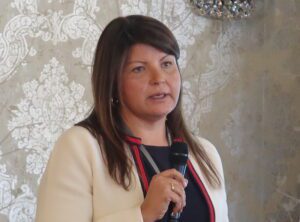Who is a member?
Our members are the local governments of Massachusetts and their elected and appointed leadership.

Danvers Assistant Town Manager Jen Breaker, a member of the Special Legislative Commission to Study and Examine the Civil Service Law, discusses civil service legislation during an MMA meeting last month.
The Joint Committee on Public Service held a hearing on March 4 on a new legislative proposal targeting overdue reforms to the Civil Service system in Massachusetts.
The bill (H. 4436) reflects a compromise proposal based on the recommendations of the Special Legislative Commission to Study and Examine the Civil Service Law.
At the hearing, Danvers Assistant Town Manager Jen Breaker, the MMA’s representative on the special commission, provided a call to action to address significant challenges with the current Civil Service system:
“The current system isn’t working,” she said. “The scope of the commission’s work was to examine necessary reforms, and move forward with a proposal that [would make] as much positive impact as possible.”
She acknowledged that some will feel that the proposed reforms do not go far enough, but said “this compromise aims to provide some important flexibility and reforms to the current system, which are desperately needed and overdue.”
Joining Breaker at the hearing, MMA Legislative Director Dave Koffman pushed for a legislative fix to the “increasingly archaic” Civil Service system, which “does not reflect current human resources and personnel management best practices.”
“The system is rigid and moves at molasses speed,” he said.
Whether it be the special commission’s compromise bill or another proposal, “we must commit to pursuing further solutions to these issues. We won’t need long to evaluate whether these provisions are providing necessary relief.”
Bill details
A focal point of the legislation is a new “hybrid” pathway that Civil Service departments could use to more easily identify candidates for municipal police and fire positions outside of the traditional process.
Civil Service cities and towns would be able to opt-in through a multi-year memorandum of understanding with the state’s Human Resources Division.
The hybrid pathway would allow for the following:
• Cities and towns could make up to 50% of entry-level police and fire appointments outside of the traditional civil service exam process, drawing from a locally generated pool of prospective candidates.
• Cities and towns could consider prospective “hybrid” candidates immediately, regardless of whether they have taken a civil service examination and without the need for a certification from the HRD.
• Prospective candidates would go through the pre-existing review process, including a pre-conditional-offer background check and post-conditional-offer medical and physical abilities tests.
• Once all conditions are met, the HRD would authorize a candidate’s employment in the same manner as traditional Civil Service candidates, subject to completion of a prescribed course of study at an approved police or fire academy, if not already completed.
• Civil Service communities could appoint incumbent police officers from non-Civil Service communities through this process for entry-level positions only, but those candidates would be considered original appointments and would not retain any seniority.
The legislation includes other recommendations from the commission’s interim final report in 2022. These include:
• Adding flexibility for municipalities in navigating residency requirements
• Adjusting the formula for entry-level certifications (from 2n+1 to 3n+1)
• Supporting and investing in cadet programs
• Lowering barriers to Civil Service exam fee waivers
• Supporting diversity scholarship models
The Special Legislative Commission to Study and Examine the Civil Service Law, established by Chapter 253 of the Acts of 2020, known as the Policing Reform Law, included numerous stakeholders, brought together to investigate potential reforms to modernize the Civil Service system, including reducing unnecessarily long onboarding timelines, providing needed flexibility for hiring, and using attributes outside of taking a test.
The panel was co-chaired by Rep. Ken Gordon and Sen. Michael Brady, who also co-chair the Legislature’s Joint Committee on Public Service.
The commission reconvened in late 2023 to begin discussions on potential legislative solutions.
A special commission presentation on key concepts of its proposal is available on the MMA website.
The Civil Service bill is expected to be reported out of the Joint Committee on Public Service and then sent to the House Committee on Ways and Means.
For more information, contact Dave Koffman at dkoffman@mma.org.